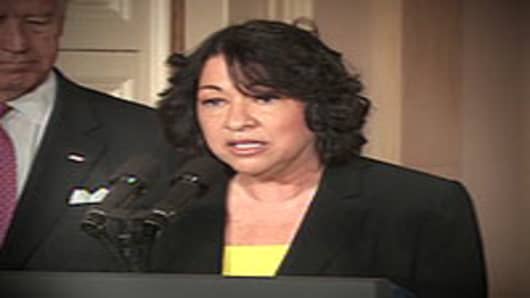"The issue was not what we would do or not do, because we were following precedent," Sotomayor said, referring to her panel on the 2nd Circuit, whose ruling was overturned late last month by the Supreme Court.
Prompted by Sen. Patrick Leahy, D-Vt., the Judiciary chairman who lined up a series of friendly questions for Sotomayor to help her counter GOP criticism, Sotomayor said she would "absolutely" have reached a different result in light of the Supreme Court's reversal.
As Sotomayor begins her second day of hearings, which is expected to stretch from Tuesday possibly into Thursday, she will likely discuss not only the "wise Latina" remark, but also appeals court decision dismissing a reverse discrimination suit by white New Haven, Conn., firefighters.
The Supreme Court, in a 5-4 decision two weeks ago, overturned that ruling by Sotomayor and two other judges on the 2nd Circuit Court of Appeals in New York.
Sen. Charles Schumer, D-N.Y., Sotomayor's biggest champion in the confirmation hearings, said Tuesday that the firefighters' case shows that she follows precedent and is not an activist judge.
"If she was on the 2nd Circuit today, she'd probably rule the other way" because of the Supreme Court's decision, Schumer said on CNN.
Democrats and Republicans alike spoke glowingly Monday about the 55-year-old appeals court judge's rise from public housing in the Bronx to her nomination to be the first Hispanic and only the third woman on the Supreme Court.
"I would hope every American is proud that a Hispanic woman has been nominated to sit on the Supreme Court," said Sen. Jon Kyl, R-Ariz.
But the GOP made clear, despite the Democrats' Senate majority that makes her confirmation likely, it will not let Sotomayor's hearings pass without raising questions about her impartiality. By extension, Republicans also are attacking President Barack Obama for what they see as a double standard in calling for her quick confirmation after voting against President George W. Bush's two high-court appointees.
The thrust of the Republican case against Sotomayor stems from a variation of a line she used on several occasions between 1994 and 2003 in which she talked about personal experience and judging.
"I would hope that a wise Latina woman with the richness of her experiences would more often than not reach a better conclusion than a white male who hasn't lived that life," Sotomayor said in a speech at 2001 at the University of California, Berkeley, law school.
Sen. Jeff Sessions, R-Ala., the senior Republican on the committee, said he is troubled by the sentiment he finds in the remarks.
"We remain focused on some fundamental questions about the philosophy of Judge Sotomayor as expressed in her statement on more than one occasion over a period of 15 years," Sessions said Monday after the hearings ended for the day. "And they've expressed a rather serious critique of the classical ideal of blind justice."
Sotomayor offered a polite, brief but firm rebuttal in her opening statement, her first substantive remarks since Obama nominated her in May to replace Justice David Souter, who retired last month.
She explained that her own experiences helped her listen to and understand the people who appear before her. "That is how I seek to strengthen both the rule of law and faith in the impartiality of our judicial system," she said.
In every case, she said, "I applied the law to the facts at hand."
The issue seemed unlikely to provoke the "meltdown" that Sen. Lindsey Graham, R-S.C., said Sotomayor would have to suffer to stop her confirmation.
"And I don't think you will" have a meltdown, Graham added quickly as Sotomayor sat listening, her face in a half-smile.
Sen. Patrick Leahy, the committee chairman, likened Sotomayor to other judicial pioneers, citing Thurgood Marshall, the first black justice, as well as Louis Brandeis, the first Jew, and Sandra Day O'Connor, the first woman.
"Let no one demean this extraordinary woman," Leahy said in a warning to committee Republicans to tread lightly in the days ahead.
There was a lot of talk Monday about baseball and the role of umpires in calling balls and strikes. It was perhaps no coincidence that the only case Sotomayor mentioned was the one involving the Major League Baseball strike that wiped out postseason play in 1994 and shortened the 1995 season. Her ruling against club owners helped bring the strike to an end.
Sotoymayor is also seeking to reassure senators that she would not take any "preconceived notions" about gun rights to the Supreme Court if confirmed as a justice.
The 55-year-old Sotomayor told the Senate Judiciary Committee Tuesday that "one of my Godchildren is a member of the NRA. I have friends who hunt."
But she also said that as a member of the high court bench, she would feel constrained by precedent, if the Supreme Court has already spoken on an issue. The high court earlier this year reaffirmed the right of people to own a gun for their self-defense.


